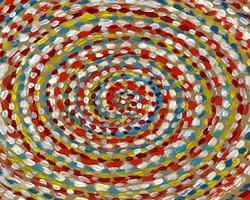People often confuse envy and jealousy. Envy is wanting what someone has and jealousy is wanting to possess someone all to yourself. With jealousy there is a feeling of ownership over the other person accompanied by a feeling or desire that they not show someone else attention, love, or affection. The jealous person feels that the object of their desire should show that attention, etc. only to them. If they think it is going elsewhere they feel enraged or overwhelmingly upset to the point where they feel they have to interfere or interrupt the activity. They may also accuse their love interest and try to punish them in a variety of ways, haranguing them, beating them, or giving them the cold silent treatment. In truly severe cases the jealous person may be imagining everything. In other cases their partner is in reality showing attention to others and may even be trying to make their partner jealous. Whatever the case, jealousy comes from a feeling of being deprived and a feeling of being overlooked or put down in favor of someone else. In other words jealousy indicates deep insecurity, lack of trust, and lowered self-esteem. Jealousy is a product of the dragon of self-deprecation, the fear of not being worthwhile.
Jealousy is not an emotion recognized by essence since essence is incapable of feeling jealous. Jealousy is purely a creation of false personality or ego to try to get the situation and the personality under its control. Jealousy is never going to lead anywhere good, even though there is a weird logic or rationale to it. Let’s look at this a little closer. The false personality tries to convince you that jealousy is good. It says, “If I can make this person I am interested in feel jealous, then they will want me very much and I will win their affection”. The problem with this is that the personality is never convinced for very long that they are truly loved. So they have to try to make their partner jealous again and again to ensure that they are still the object of desire. This is an ego game, pure and simple.
There is a difference between setting appropriate boundaries and being unreasonably jealous. If a drunk man shows too much attention to another man’s wife, the husband may at some point have words with the drunk to get him to lay off or he may gather his wife up and leave the situation much to his wife’s relief. That is a necessary boundary. On the other hand, if a man’s wife is innocently talking to a neighbor about the weather and the husband bundles her away and accuses her of making eyes at the other man, that is jealousy.
Younger souls and teenagers of any soul age often use jealousy in a game playing way. For example, a girl may try to make the boy she is interested in jealous by flirting with another guy in front of him. While this sometimes works it is often destined to create the opposite effect. This is a way of trying to manipulate someone by tapping into their insecurities. In this case if the boy becomes truly jealous then he is probably also deeply insecure, not such a good candidate for a partner. If he is not jealous then he is either not interested or he may in fact be a great partner in the long run.
Sometimes these games become karmic as each person tries to pay their partner back for making them jealous by engaging in the same flirtatious behavior with another. This is going to end badly.
Older souls don’t have much use for jealousy and often ignore the situation or simply walk away from it. If their partner is overly jealous they usually leave that partner rather than play the games required to please their partner.
To deal with jealousy you have a variety of choices.
If you are the jealous one:
- You need to determine whether the situation calls for you to establish a necessary boundary. If someone is behaving in an aggressive or inappropriate way then the situation may call for boundary setting, not jealousy.
- If your partner is deliberately engaging in game playing and trying to make you jealous you may determine that you don’t want to play. You need to communicate this to them and if they don’t get it it’s time to walk.
If you have a jealous partner:
- If you have a history of playing around then feelings of jealousy may crop up in response to you flirting in front of your partner yet again. Since this is insensitive or possible disrespectful on your part, they may have good reason to feel miffed and may even choose to leave you. That would serve you right.
- If you have no history of playing around and your partner is unreasonably jealous every time you even talk to someone then they have a problem and this has to be worked out in therapy or the partnership has no hope of lasting. All of this requires communication and big time honesty.
These are the more obvious dynamics of jealousy. On occasion, the maneuvers become complex and require real self appraisal.
Over many years of marriage I have experienced men showing inappropriate attention to my wife Lena on a couple of occasions. This has always been uncomfortable because I have to evaluate my actual feelings. Am I feeling jealous or am I actually feeling something else that is related to the situation? Is it something I should actually do something about? Should I ignore it or is it something she should address directly with the man involved if she agrees it is a problem? One time I was faced with a unique challenge. A man appeared to me to be hustling Lena and she was clueless as to the inappropriate attention and actually seemed to be liking it. I include this more personal experience here because I have talked to many people who have experienced the same thing in their relationships.
Now the question arises, what is inappropriate attention and what is normal? That is of course quite subjective. In this case I had to look at many aspects. He was offering to give her massages on a regular basis. He was regularly pulling her aside and engaging her whenever I was not around. I noticed his hands all over her. Now, the handsome man in question had a history of womanizing but not successfully partnering up with anyone. He was also a student in a program we were running and he was discovered to have been making his way, one by one through the women in the group. He was also discovered to be a closet alcoholic. I realized that my discomfort was not really jealousy but rather a sense that whatever was going on here was an attempt to sabotage the group and the work we were trying to do and that it needed to stop. I also recognized that he was playing the classic game of undermining the authority, also known as “Kill the King”. This game is an American favorite and may be played in a variety of ways but one of the main ways is to cuckold the king or the leader and make him impotent. It is a game as old as the hill.
My solution was to outline the situation as I saw it to Lena and get her agreement that something was seriously amiss. She was horrified when she realized the facts. Then together, we kicked the student out of the program, a very messy process.
The painful aspect of this experience was the questioning whether or not I was being unreasonable and actually engaging in petty jealousy. When I finally added everything up I realized I was not. This uncertainty is a sure sign of self-deprecation. I ended up realizing I had attracted this situation to me to work on my self-deprecation. In this sense it was useful, if not extremely unpleasant.
One way or the other jealousy usually has to do with self-deprecation.
So now let’s look at envy.

Remote Shamanic Healing
Each month, around the new and full moons, Jose, Lena or Anna leads a remote shamanic healing session. These approximately 30 minute sessions are designed to be experienced in a quiet, safe place free from distraction. Even if you cannot join live they can be very powerful, and always include a good clearing and beautiful icaros. These are live webinars where you cannot be seen or heard. You can hear the practitioner and see their altar for that evening. Recording access is included for 48 hours afterwards. See the product description for dates and times.
Envy
Simple greed is wanting what others have for yourself except in bigger proportions than is reasonable. Envy is wanting what someone else has and 1. Feeling badly that you don’t have it and 2. Being upset with them because they do. If you have envy, then you are probably going to feel good if the other person loses what they have. In fact, you might even try to get them to lose it and hopefully lose it to you. As you can readily see, envy is a product of the dragon of greed. The origins of it always come from deprivation and the deprivation is almost always about love. If a child grows up with some abandonment then they will develop a craving for what they have been deprived of. Eventually this craving will mutate to other things. Instead of love they will crave money, sex, attention, power, information, or material things. When they see another who has what they want, they are reminded of their deprivation and their pain. This causes them to hate the person who has what they want because they see them as the depriver even if they have had nothing to do with them in the past. This is the classic dynamic of projection. In some cases, if the hate is strong enough, the envious person will be driven to destroy them or take away from them what they want. We see this behavior in some of the classic Shakespearean tragedies and of course actual historical dramas that have initiated wars and affected millions of people.
Behind envious feelings is the most searing emotional pain that a human can experience. There is practically no worse pain that that of abandonment and loss. For an envious person to make progress and deconstruct their envy, they must face feelings of absolute hopelessness and despair. Since most people don’t want to do that, they don’t often heal their envy. To boot, envy is an emotion that is primarily to be found in younger souls and they are not known for their motivation to work on it. They are more likely to act it out until they have hurt a great many people. The long term solution for envy is karmic consequences and that is the slow way of learning.
If you want to release envy, you will have to face your despair that you will ever be loved. This is worth doing. In fact you will have to face it sometime in someplace in some set of circumstances. There is no avoiding it. Might as well get to it now because it will always be awaiting you in the future if you don’t.
If you recall the scenario I described earlier about the man playing “Kill the King”, you can see some of the dynamics of envy. While my challenge was dealing with my self-deprecation, his mechanics were driving him to try to take something away from someone else to have for himself, classic envy and greed. Because he did not deal with his dynamics, the result was that he lost everything. Relationships with Lena, myself, his compatriots, and participation in the program that he hoped would help him. That is the classic consequence of envy and/or greed. When I saw this in his dynamics it was easier to forgive him and understand the pain he was in. There were still consequences however.
Here are several things to do if you feel envious of others. 1. Start by forgiving them for what they have. 2. Forgive yourself for wanting it. It’s OK. 3. Now intend that they have what they have. Get behind it. Choose it. Give it to them. For example, “I give you the fame and fortune that you have. I give you that wonderful job that you have. I give you your big inheritance”. 4. Now spend a few minutes contemplating what it would be like if you had that. “I wonder what it would be like if I had a wonderful job too”, not your job. 5. Realize that you don’t have to take away from the other person what you want. They can have it; you can have it. The only time this is a problem is when you are tangling over a finite object like a woman or a man or a house. Then you have more work to do. I usually recommend that you give up your portion to the other person. Let go of the lawsuit. Let go of the fight. Instead face the pain of loss. When people do that instead of fighting on, they usually find relief and some happiness. When they fight on, they usually lose everything in the process. Even when they win the lawsuit, they do not find happiness or what they are looking for. Sometimes it is better to lose than to win.
It is not necessarily fun to contemplate the uglier emotions like jealousy and envy, but it is interesting. When you look directly at these monsters you can see that they are the pathetic motivations of the false personality to manipulate the world and that they will never ever bear fruit. That fruit is the stuff of pure fantasy, a total illusion. How many times do we need to get our asses kicked to learn the truth.
Right now and for the next several years we have the extraordinary opportunity to change long term personal patterns, totally deconstruct them or erase them and replace them with healthier behavior. If you ever wanted to overcome an addiction or habit pattern this is the time. If you don’t, you may be stuck with it for the next several centuries, not a good prospect. This is a fork in the road, a choice point. Deal with jealously now; erase self-deprecation. Deal with envy now; erase greed. You will be happier for sure. You win by losing what is not good for you. This is a good contemplation to have in life. What, if I lost it, would this help me to be happier?
Tags:

José Stevens
José Luis Stevens, PhD is the president and co-founder (with wife Lena) of Power Path Seminars, an international school and consulting firm dedicated to the study and application of shamanism and indigenous wisdom to business and everyday life. José completed a ten-year apprenticeship with a Huichol (Wixarika) Maracame (Huichol shaman) in the Sierras of Central Mexico. In addition, he is studying with Shipibo shamans in the Peruvian Amazon and with Paqos (shamans) in the Andes in Peru. In 1983 he completed his doctoral dissertation at the California Institute of Integral Studies focusing on the interface between shamanism and western psychological counseling. Since then, he has studied cross-cultural shamanism around the world to distill the core elements of shamanic healing and practice. He is the author of twenty books and numerous articles including Encounters With Power, Awaken The Inner Shaman, The Power Path, Secrets of Shamanism, Transforming Your Dragons and How To Pray The Shaman’s Way.
Related Articles
The Evolution of Perception and Fear
The Challenge Of Creating Our Future
The frequency of the Earth is shifting, The hertz frequency of the earth is dropping temporarily while changes are being made from the core of…




